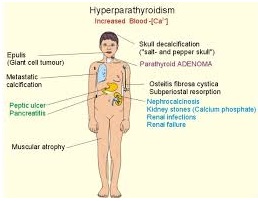Hypoparathyroidism Causes, Symptoms, Diagnosis and Treatment

What Is Hypoparathyroidism ?
Hypoparathyroidism is a rare condition marked by abnormal secretion of parathyroid hormone.
Characterized by low secretion of PTH, Hypoparathyroidism can increase the risk of developing kidney stones and chronic kidney diseases.
PTH plays an integral part in the regulation and maintenance of two minerals in the body, namely calcium and phosphorus, and may play a part in the production of vitamin D. Every individual has four glands in the neck which produce PTH.
Hypoparathyroidism can therefore lead to abnormally low levels of ionized calcium and a high level of serum phosphorus in the blood and bones.
Possible symptoms may range from cramping to twitching of muscles (involuntary muscle contraction).
Treatment of Hypoparathyroidism mainly consists of intake of iron supplements in order to overcome the effects of Hypoparathyroidism.
Causes Of Hypoparathyroidism:
Causes of Hypoparathyroidism may include the following:
- Injury or removal of the parathyroid glands
- Development of DiGeorge syndrome
- Genetics- it may run in families
- Development of autoimmune disease
- cancer radiation treatments, specifically to the neck
- A defect in the calcium receptor may lead to a rare congenital form of the disease
- Hemochromatosis can lead to iron accumulation and consequent dysfunction of parathyroid.
- low magnesium levels
Possible risk factors may include:
- having had a neck surgery recently
- A family history of hypoparathyroidism
- Having certain endocrine conditions, including Addison’s disease
Symptoms Of Hypoparathyroidism:
Many of the symptoms are caused by low level of ionized calcium in the blood. Possible symptoms may include:
- muscle aches or cramps
- tingling, burning, or numbness in the fingertips, toes, and lips
- muscle spasms
- patchy hair loss
- dry skin
- brittle nails
- fatigue
- anxiety or depression
- painful menstruation
- seizures
- Fatigue or weakness
- Brittle nails
- Headaches
- Memory problems
Diagnosis Of Hypoparathyroidism:
Hypoparathyroidism can be diagnosed via:
- Blood tests, to check the level of calcium, phosphorus, magnesium and PTH in the system
- Urine test, to determine if excess level of calcium is being secreted
- Electrocardiogram, to detect abnormal heart rhythm
- X-rays, to determine the extent to which bones of the affected individual have been affected.
Treatment Of Hypoparathyroidism:
The following medications are used in order to treat hypoparathyroidism:
- Iron supplements
- Oral calcium carbonate tablets
- Vitamin D doses
- Intravenous infusions, for immediate relief from symptoms
By : Natural Health News




